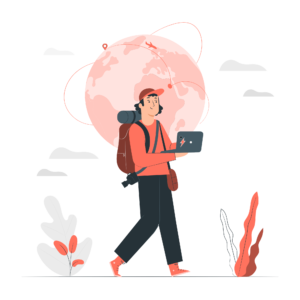Part 3 - Trends that businesses need to look out for
Covid-19 has undoubtedly left its mark on businesses globally. Read on as we share how the pandemic has transformed business + tips on how to be better prepared.

In this three-part series, we will be sharing our perspectives on the impact of Covid-19 on businesses, and how businesses can prepare for the new normal. We will examine aspects of the post-pandemic economy; the long-term influence on business models and the potential for a broad recovery led by enhanced productivity and innovation.
It is either a sage or a fool who can confidently predicts the future.
The two trends to look out for
But looking forward from 2021 to 2025, there are two trends that are almost bound to happen.
The first is the increasing call for biosecurity, the second is the growing immersion of digital interaction.
Biosecurity covers a wide area, but the most urgent need is to have a foolproof system to track food from growing/harvesting to the table. This is to ensure no contaminated food would sneak/place into the process and endangers life.
Immersion digital interaction needs little explanation for anyone who has spent hours on Zoom or other similar video conferencing platforms.
Why these two trends?
Given the way Covid-19 and its vast, growing and mutating family of viruses continue to surface and kill, biosecurity and digital interaction could be seen as flip sides of the same coin : to ensure as little transmission as possible, food security is essential, and so is social distancing, hence the need for more immersive engagement online.
It is a safe bet that digital interaction would be very different in, say, 2025, compared with the boring, screen-staring Zoom everyone is used to in 2020 and 2021.
What to expect in the next 5 to 10 years?
Digital Interaction
Unfortunately, it is also a safe bet that, despite the cry for thorough biosecurity in the food process, very little is likely to happen.
Underlying both trends, one rising and the other stagnating, is money. With the billions that would pour into digital interaction, online meetings in a few years would feature many aspects found today only in science fictions, especially Snow Crash by Neal Stephenson, who predicted the industry nearly 30 years ago. Stephenson was also the inventor of avatars and the inspiration of Google Earth and the once-highflying virtual world called Second Life .
Virtual reality, augmented reality, avatars meeting and shaking hands, virtual properties commanding the price of real-life counterparts (where else could one hang up an expensive NFT but in a virtual home?) would all be available, and soon commonplace. The increasing work from home (WFH) would have major impact on property prices (office less necessary, homes that can be half a world away from ‘office’), and in the entire urban landscape of society.

Biosecurity
At the same time, there would be huge resistance coming from big business and some governments against implementing the necessary biosecurity measures to cordon off viral spread and save lives.
The stark reality of virus infestation is that viruses do not work alone. They meet and intermingle and mutate, and in environments which enables large number of trial and error, a successful mutation would emerge, spread and trigger another pandemic.
The more the world intermixes, the more world trade ties farmers from Southeast Asia, fishermen from Peru and livestock breeder from the US to consumers globally, the more opportunities there are for the viruses to meet, engage, mutate and spread.
The game changers
A proper biosecurity system would require cooperation among all those involved. It would also require big businesses to be transparent in their cross-region, cross-border movements. Needed would also be an understanding of the corporations handle cleanliness, waste disposal and other safety measures, and proper control implemented to make sure there would be no breach of security.
Big businesses always balk at external controls. And they have the muscle to lobby and interfere with policies that hinder their freedom of movement. Take a look back at 2020, millions had died and yet not a single new measure had been put in place to increase security. Look back from 2025, it is likely that nothing in this space has changed.
So money drives and money hinders. The world can look forward to more pleasant digital interactions in the next few years, but we would be as vulnerable to a pandemic as we were in 2019. This is the world we live in.
